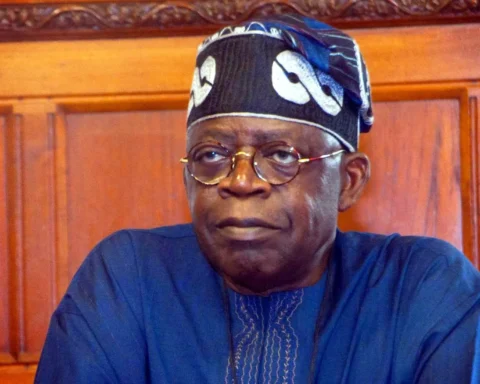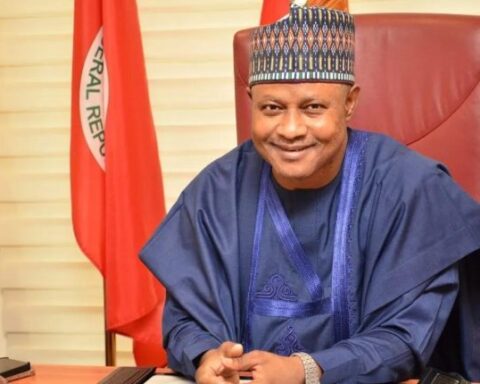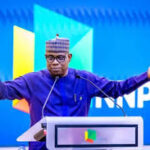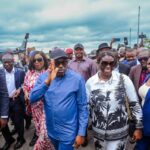Minister of Power, Adebayo Adelabu, has apologised to Nigerians over recent power outages as a result of grid collapse that affected parts of the country, blaming it on obsolete equipment that are as old as 50 years.
On the current blackout, he said security has been strengthened to allow the Transmission Company of Nigeria (TCN) to carry out repairs, with support from the National Security Adviser and military officials.
He said measures are underway to restore power across 17 northern states facing outages caused by vandalism of the Shiroro-Kaduna transmission line.
According to him, the national grid collapsed only once but was forcefully shut down the second time due to an explosion at the Jebba plant, which is 47 years old.
Adelabu appealed to residents in the northern states affected by the outages, urging them to remain patient while calling for vigilance against vandalism.
“With the provision of full security, the TCS staff will have the confidence, together with the contractors, to go to the field and fix it. So I’m just appealing to our northern brothers and sisters, fathers and mothers, to bear with us that very soon, light will be restored, and we must all collectively protect our national grid to avoid further vandalisation,” he said.
He acknowledged the aging infrastructure, stating, “We have a national grid that is more than 50 years old,” with many transmission lines and transformers in disrepair, liking the situation to “a rickety car” which is expected to break down from time to time until a complete overhaul of the grid is carried out.
“Before this, the last disturbance of the grid was about four months ago, which meant that we have been managing the grid. Let me tell you the truth of the matter is, we have old infrastructure. We have a national grid that is more than 50 years old. We have a national grid whose transmission lines are weak, the towers are falling and the substations, the transformers are old. In fact, the transformer that actually exploded in Jebba was 47 years old. We’ve been trying to revamp this to change them, but they cannot all be changed overnight.
“So it’s like you’re having a rickety car. You’ll be expecting breakdown once in a while. What we do is to continue to manage the grid to prevent frequent occurrence of the grid disturbance, until we’re able to completely overhaul the grid itself, then we’ll have a reliable grid,” he stressed.
To mitigate future outages, Adelabu announced plans for a “super grid”—a backup system designed to provide alternative power routes during disruptions.
He emphasised the need for regionalised grids to insulate states from widespread failures, stating: “Lastly is the fact that the world has moved beyond having a centralized grid. Grid must be regionalized. We must have State grids so that each of the grids will be insulated from each other so that a problem in a particular line will not affect others. That is what we are working on. Until that is done, we believe that we’ll keep managing what we have and reduce the frequent occurrence of the great disturbance.”
Adelabu also assured that talks are on with the Nigerian Electricity Regulatory Commission (NERC) to address consumer grievances regarding recent power outages, particularly for those in Band A tariff categories.
He confirmed that he will meet with NERC Chairman Sanusi Garba and electricity distribution companies (DisCos) to discuss compensation measures.
“For those days during which they suffered blackout, there should not be billing of any sort for any customer,” ensuring that both residential and industrial consumers will be exempt from charges during outages.
Adelabu said he briefed President Bila Tinubu on the current electricity supply disruptions affecting 17 northern states, primarily due to vandalism of the Shiroro-Kaduna transmission line.
“The root cause of this issue is the vandalization of our key transmission lines,” Adelabu stated, confirming that the Transmission Company of Nigeria (TCN) is mobilizing efforts to restore the damaged infrastructure.
To expedite repairs, he said President Tinubu has directed the National Security Adviser, Nuhu Ribadu and the service chiefs to provide security cover for the repairs to be effected.
He said: “I briefed Mr. President, among various other things, including the issue of the disturbance in electric supply to the northern part of Nigeria, about 17 states.
“We discussed the root cause of this, which was basically due to vandalization of the transmission lines of Shiroro Kaduna line, which is the major line that supply electricity to the north, and the transmission Company of Nigeria, TCN, are already set out to fix this line. What they have asked for, which has been provided to them now is the security cover of the National Security Advisor through the chief of army staff and Chief of Air Staff to enable them restore the damaged land. And we are optimistic that very soon this will be fully restored,” he added.
Adelabu also mentioned alternative solutions, including utilizing the Ikot Ekepene substation from the Calabar plant, although this line has faced its own challenges. He emphasized the need for an upgrade to the Shiroro-Kaduna line, which is one of Nigeria’s oldest transmission lines.
“We have also explored the alternative line of providing light to the north through the Ikot Ekepene substation supplied from the Calabar plant, but the line got cut along the line, and we are also trying to fix that. And if you remember that at the last FEC one of the approvals for the ministry of power was actually the upgrade of the Siroro Kaduna transmission line, which is the major line that supplies electricity to the northern part of the country.
“We already have approval for this. It is one of the oldest transmission lines that we have in Nigeria, and we believe that it requires an upgrade. And through the magnanimity of Mr President and the Federal Executive Council, we got approval to fix the line on a permanent basis. Once this is done, I believe that power to the North will be more stable than we’re experiencing right now.”
Looking ahead, Adelabu proposed a distributed power model that would provide each northern state with solar energy sources.
“Before I end this, let me also state that the world is moving this is the 21st century, and we believe that the most effective way of supplying uninterrupted, functional, stable and reliable electricity to the northern part of Nigeria is through our distributed power model, whereby each of the northern states will have an embedded utility, solar scale, solar source.
“All the 20 states will be insulated and immune from each other, actually made progress in this as we have interested contractors and financiers that are ready to install 100 megawatt each for each of the 20 northern states, which is scalable to 50 megawatts at first, then upgraded to 100 megawatt,” he surmised.



























